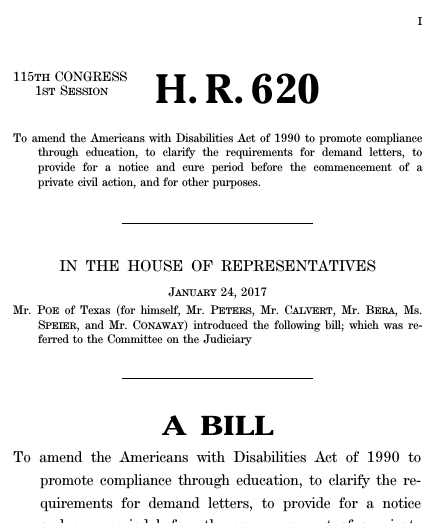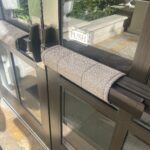 In January of this year, a bill was introduced in the U.S. House of Representatives by Representative Ted Poe of Texas. On September 7th, the House Judiciary Committee voted to advance this bill – H.R. 620. While at first glance it might seem like a bill dedicated to education about the Americans with Disabilities Act (ADA) would be beneficial, it’s important to understand the details and the implications of this bill.
In January of this year, a bill was introduced in the U.S. House of Representatives by Representative Ted Poe of Texas. On September 7th, the House Judiciary Committee voted to advance this bill – H.R. 620. While at first glance it might seem like a bill dedicated to education about the Americans with Disabilities Act (ADA) would be beneficial, it’s important to understand the details and the implications of this bill.
I’m not going to reinvent the wheel here…many organizations have already posted the relevant information on their websites:
The National Disability Rights Network (NDRN) has published an overview of the organizations concerns with H.R.620, and the American Civil Liberties Union (ACLU) has published a list of myths and truths about this bill. The American Association of People with Disabilities (AAPD) includes a call to action on their site, and this article by Gillian Walters gives a great overview of the problems that would be created by this bill. The Disability Rights Education and Defense Fund (DREDF) has posted a long list of resources on their website, including a summary of their concerns:
H.R. 620 would weaken the Americans with Disabilities Act (ADA), a critical source of rights for people with disabilities to architectural access in public accommodations—that is, businesses such as stores, restaurants, hotels, etc.
H.R. 620:
A. Removes any incentive for voluntary compliance.
B. Rewards non-compliance by allowing businesses generous additional timelines, even though the ADA’s very reasonable requirements are already over 25 years old! The ADA is already carefully crafted to take the needs of business into account.
C. Pretends that money damages requested from businesses are part of the ADA. Actually, this part of the ADA doesn’t even allow money damages, so changing the federal ADA will not affect any state law money damage provisions;
D. Ignores the extensive, free educational resources already available today to any business on how to comply with the ADA.
E. Ignores the effective & extensive methods already available to courts and state bar associations to deal with a very few frivolous lawsuits or unscrupulous attorneys. We should use those existing legal mechanisms when needed, rather than deny the civil rights established by the ADA that aid people with disabilities every day.
F. Look behind the media myths: The vast majority of ADA attorneys and plaintiffs are seeking solutions to fix real denials of access. But the business community has pushed the media to portray “a few bad apples” as a landslide.
~~~
Over the last few years, we have seen first-hand the effects that the political process can have on life safety, fire protection, and accessibility. It’s our responsibility to be informed about threats to the codes and standards that protect building occupants and ensure access and egress for all.
I’d love to hear your thoughts on this issue.
Thank you to George Cutler of Quarters Hardware ( and his mom 😀 ) for bringing this bill to my attention.
You need to login or register to bookmark/favorite this content.






Thanks for posting Lori. Will spend the weekend reading through the bill and the links provided. Just when you think you have heard it all, this comes along.
Have a great weekend,
Michel
Lori – I really appreciate this post. There is still a lot of work to do to make places equally accessible and egress-able for individuals with disabilities. This is going backward. I will pass this along to garner some support against it. Thanks again.
Aloha,
Jean Tessmer
What politician can I contact about this?
Thank you
Thanks for asking, Larry! Try this:
WHAT YOU CAN DO:
-> Contact your member of congress through the Capitol Switchboard at (202) 224-3121. Message: Vote NO on HR 620, the “ADA Education and Reform Act.”
-> Tweet your member of congress: #Disability rights = civil rights! Protect The #ADA, Vote NO on #HR620.
TO REACH YOUR MOCs:
1. Reach MOCs via the Capitol Switchboard: (202) 224-3121
2. Look up your elected senators and reps.
3. Use Faxzero to send free faxes from your computer to your Senator or Congressperson.
4. Use Resistbot to send faxes to your senators right from your phone: Text the word “RESIST” to 50409.
– Lori